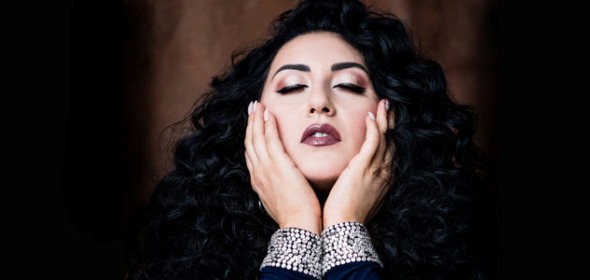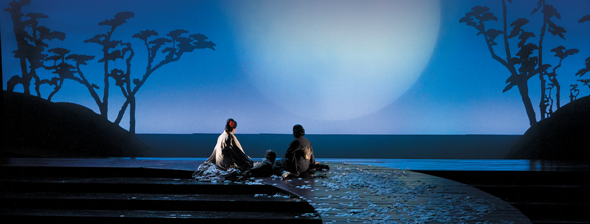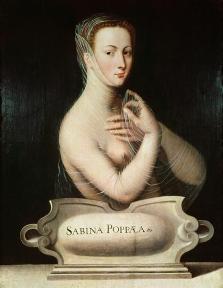Welcome to opera’s Roaring ’20s: New voices spark resurgence in a once-wavering art form
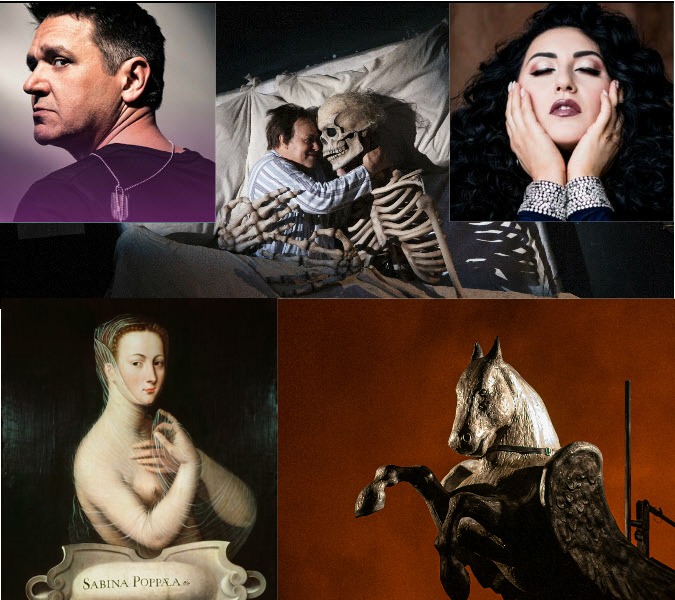
Among great opera stories headed Chicago’s way, clockwise from upper left: Nathan Gunn in ‘Soldier Songs,’ Tchaikovsky’s Hitchcockian ‘Queen of Spades,’ Anita Rachvelishvili as a scorned lover in ‘Cavalleria rusticana,’ Wagner’s epic Ring Cycle based on ancient Norse myth, and Monteverdi’s ode to Nero’s obsession with Poppea.
Commentary: Chicago’s burgeoning opera scene offers a winter-spring mix of new works and classics infused with fresh spirit.
By Nancy Malitz
If, back in the 20th century, you had told me that opera would radically ascend as an American art form, I would have said no way. Surely opera companies, more than symphony orchestras, stood in great danger of obsolescence. The canon of works was European, old and getting older, and sung in foreign languages.The stars with the greatest vocal gifts didn’t necessarily look their parts compared to standards set by Broadway. Amplification was in. DJs were hot. Film made fantasy impossibly real. Opera cost a lot.
But here we are at the starting gate of what looks to be opera’s Roaring Twenties, not least here in Chicago, which is blessed with a young and absolutely fearless theater audience – schooled by the likes of Goodman and Steppenwolf and an abundance of storefront theaters.
This audience is up for anything as long as the story-telling is good, and opera’s spring season is filled with enticements, not always from the usual suspects, although both Lyric Opera of Chicago and the Chicago Symphony Orchestra will do their part. Soon to open is “Freedom Ride,” a world premiere at Chicago Opera Theater about the young volunteers who risked their lives in 1961 to ride interstate buses in mixed racial groups after the Supreme Court riled the South by ruling against segregation on those buses and their attendant restaurants and waiting rooms.
[See “Freedom Ride” details, and list of Upcoming Chicago Opera Performances, below.]
Backstage at Lyric Opera during its particularly exciting 2019 fall season, the 40-year-old guest conductor James Gaffigan made it clear he was keen about opera’s prospects for his own show-going generation. “People my age are not really interested in divas,” he said, his fingers setting that last word in quotation marks. “Today, we check out the show ahead of time. We look at the videos and decide whether we are drawn to the idea.” Gaffigan was fresh from leading some blistering Shostakovich at the Chicago Symphony Orchestra and had plunged into Mozart’s “Don Giovanni,” a very dark comic opera about the hellbound libertine Don Juan – vintage 1787 and still vital. Lyric’s sensational young cast included 35-year-old American soprano Amanda Majeski as one of the Lothario’s furious victims, now obsessed with curbing him.
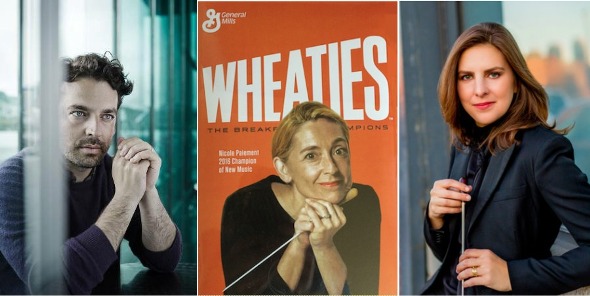
Re-thinking opera: James Gaffigan and Nicole Paiement at Lyric earlier this season, and COT’s leader Lidiya Yankovskaya. (Photos ©Daniela Kienzler, Opera Parallèle and ©Kate Lemmon)
Gaffigan marveled at how Mozart’s story races from boss-bashing comedy to something “extremely serious – maybe a rape – to murder in the first five minutes” and stressed that arresting presentations will always pull people in: “Things like (Ligeti’s) ‘Le Grand Macabre,'” he said of the late-20th century satire stuffed with a giant spectral puppet doomsayer and episodes for car horns, doorbells and alarm clocks that was New York Philharmonic’s audacious hit of 2010. “Similarly, if you put on (Debussy’s tragic love story) ‘Pelléas et Mélisande’ all by itself, people will walk out, but a beautiful production can be transfixing.” (The Chicago Symphony Orchestra found out as much when Esa-Pekka Salonen conducted it in a semi-staged pastel dream.) “And at the Met, the big Zefferelli extravaganza, people love that,” Gaffigan added in reference to the legendary Italian film and opera director’s luxuriously over-the-top production of “La bohème” from 1981 that may never leave the Met rotation simply because the public won’t let it. (Here’s Zeffirelli rehearsing the original cast.)
I don’t know which was the bigger surprise for me during Lyric Opera’s 2019 fall season – that spell-binding revival of Mozart’s “Don Giovanni” led by Gaffigan and directed by Goodman Theatre’s Robert Falls, in a treatment newly heightened by #MeToo energy, or Jake Heggie’s 2000 “Dead Man Walking,” which ended with a moment of overwhelming silence after the Death Row story came to its inevitable end. When people say, “You could hear a pin drop,” it is almost never true. But it was true on the night I saw it, until the place cracked into wild applause.
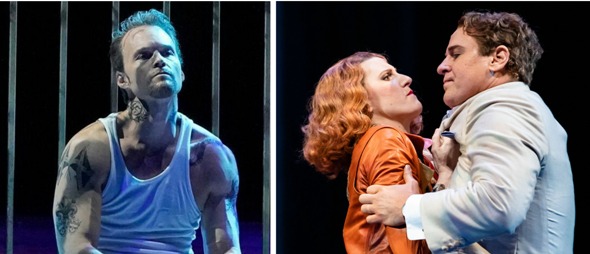
Ryan McKinny on death row in ‘Dead Man Walking’; Amanda Majeski as Elvira and Lucas Meachem as her defiler in ‘Don Giovanni.’ (Lyric photos: Andrew Cioffi; Kyle Flubacker)
“Dead Man Walking” was conducted by Nicole Paiement, who launched a career by identifying recent operas that she considers to be masterworks, then helping them build a buzz by means of second productions designed for entrepreneurial companies, many of them young and small and brave enough to give promising operas a shot. One such company is the attention-getting Opera Parallèle, which Paiement founded in San Francisco in 2010 with Brian Staufenbiel, who spearheads the shows’ conceptual designs. The company’s enormous impact prompted the head of the American Composers Forum in 2016 to designate Paiement its “Champion of New Music,” displaying her image on a Wheaties box.
Another opera Paiement says she’d love to see streamlined is Thomas Adès’ 2017 “The Exterminating Angel,” based on the cult film by Luis Buñuel about a lavish dinner party whose guests find themselves mysteriously unable to leave. It was a brilliant hit at the Met in 2017, but it’s simply gargantuan, perhaps in need of a more nimble version. Right now Paiement’s company is at work on something similar – a honed and “radically re-imagined” treatment of Stewart Wallace’s 1995 “Harvey Milk” for its upcoming spring season on the West Coast. Wallace’s opera deals with the 1978 double assassination of the gay California politician and the mayor who supported him.
“Lyric’s ‘Dead Man Walking’ is a grand opera production in every way,” Paiement said while she was at work on it in Chicago, “but Jake Heggie’s opera also has the capacity to be nimble. There are versions just as powerful for smaller companies, and that has helped this piece a great deal.”
Heggie’s midsize “Moby-Dick” was recently put on with great success at the Harris Theater by Chicago Opera Theater, conducted by its music director, Lidiya Yankovskaya. She will be in the pit once again for COT’s upcoming world premiere of “Freedom Ride,” an opera set in the heart of the 1961 civil rights movement. Yankovskaya has championed the development of “Freedom Ride” since she heard composer Dan Shore’s first excerpts.
“Ten years ago, there were almost no new works being produced by opera companies and the situation was really dire,” Yankovskaya recalled recently by telephone. “Those of us who were getting out of school had to find ways to do it ourselves from the ground up.” COT’s Vanguard Initiative, supported by a Mellon Foundation grant, is designed to bring such projects along.
“It has taken us about a decade to become experts, but I think now is the time for those of us who went into this arena to create something that wasn’t there before,” Yankovskaya surmised. Among these operas a-borning is Stacy Garrop’s “The Transformation of Jane Doe,” now set for an interim showing in April, among other promising developments by companies in the area. (see details below).
Chicago Opera: 14 shows, five from 2018 or newer
These are big theatrical stories all, from companies both large and small, for your showtime calendar. A significant handful are brand new or less than two years old:
Muti conducts “Cavalleria rusticana” (1890) by Mascagni, in concert
Feb. 6, 7, 8: Chicago Symphony and Chorus, click for details.
Chicago’s most celebrated opera conductor is Riccardo Muti, whose habit as music director at the Chicago Symphony Orchestra is to fit in an annual opera-in-concert starring world-famous singers in their prime. This one-act sizzler by Pietro Mascagni stars mezzo-soprano superstar Anita Rachvelishvili as the jealous Santuzza, who learns her lover has turned to another in a small village with few secrets The fast-paced story with its bloody arc transpires on an Easter Sunday.
“Madama Butterfly” (1904) by Puccini
Feb. 6, 9, 14, 17, 21, 24, 29, March 4, 5, 7, 8: Lyric Opera of Chicago, click for details.
Among the most popular opera ever written, “Madama Butterly” is based on a semi-autobiographical story about an extraordinary young geisha, Cio-Cio San, who loses her gullible heart to an American naval lieutenant and marries him, only to learn, after waiting literally years for his return, that he has remarried stateside and wishes to reclaim their son. Against the spare beauty of Christopher Oram’s set, the production was originally conceived by Michael Grandage, who works in both theater and opera and was for years the artistic director of London’s cutting-edge Donmar Warehouse.
“Freedom Ride” (2020, world premiere) by Dan Shore
Feb. 8, 14, 16: Chicago Opera Theater@Studebaker Theater, click for details.
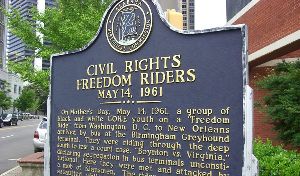 When the Congress of Racial Equality heads south for New Orleans in the summer of 1961, student Sylvie Davenport is inspired to board a Greyhound bus with those freedom riders, believing the future of their nation is at stake. Tazewell Thompson directs Cardiff prize winner Lauren Michelle (soprano) in this world premiere, developed at Xavier University of Louisiana with the activists who lived the history. Yankovskaya conducts.
When the Congress of Racial Equality heads south for New Orleans in the summer of 1961, student Sylvie Davenport is inspired to board a Greyhound bus with those freedom riders, believing the future of their nation is at stake. Tazewell Thompson directs Cardiff prize winner Lauren Michelle (soprano) in this world premiere, developed at Xavier University of Louisiana with the activists who lived the history. Yankovskaya conducts.
“The Queen of Spades” (1890) by Tchaikovsky
Feb. 15, 19, 23, 26, Mar. 1: Lyric Opera of Chicago, click for details.
In this Russian romantic opera, Gherman (tenor Brandon Jovanovich) is an unhappy soldier driven crazy by his obsessive desperation to know a mysterious old countess’ secret to winning at cards. Based on a story by Pushkin, the eerie psychological thriller sweeps along like a turbulent dream to music that is really quite grand. Lyric will be mounting a production, by Richard Jones, that’s new to Chicago, though it has been around for a couple of decades. Among the opera’s notorious Hitchcockian touches is a scene that puts Gherman, by then beyond sanity, in bed with a skeleton. (Image credit: Felix Sanchez, Houston Grand Opera)
“Two Remain (Out of Darkness)” (2018) by Jake Heggie
March 28, 29, April 1, 3, 4: Chicago Fringe Opera@Stage 773, click for details.
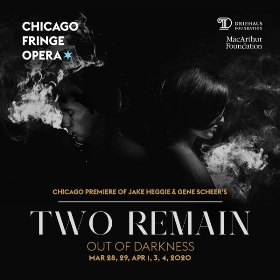 Heggie’s latest opera is based on separate journals by two Holocaust survivors: Krystyna Zywulska and Gad Beck. Zywulska was a political prisoner at Auschwitz-Birkenau who composed lyrics to inspire fellow prisoners even as she carried out her job to catalog the personal effects of thousands who were murdered. Her account of life and death in the camps was published in Poland immediately after the war.
Heggie’s latest opera is based on separate journals by two Holocaust survivors: Krystyna Zywulska and Gad Beck. Zywulska was a political prisoner at Auschwitz-Birkenau who composed lyrics to inspire fellow prisoners even as she carried out her job to catalog the personal effects of thousands who were murdered. Her account of life and death in the camps was published in Poland immediately after the war.
Gad Beck was an Auschwitz survivor who had been active in the Jewish underground in Berlin. His story, published in 1995, related memories of a hidden romantic past with a young man who refused Beck’s help to escape from a pre-deportation camp because his family, also detained, needed him.
“The Ring Cycle” (1848-1876), four-opera festival, by Wagner
Weeklong cycles starting April 13, 20, and 27: Lyric Opera of Chicago, click for details.
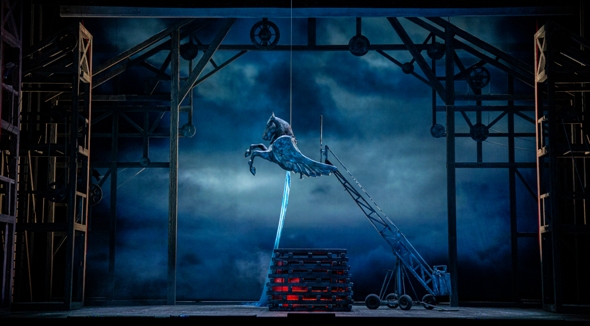
Technical rehearsals are underway for ‘Götterdämmerung,’ the grand finale of Wagner’s ‘Ring’ Cycle. The opera will be offered singly or as part of a total immersion festival. (Andrew Cioffi)
This epic four-part drama called “The Ring of the Nibelung,” loosely based on Norse and German sagas, starts with the theft of some gold and ends with the twilight of the gods and the dawn of man. Lyric has been building up to the “Ring” one opera at time, launching each work individually over the course of four separate seasons. Now comes the total-immersion package that follows the adventures of various races of gods and mortals who inhabited realms above, below, and on the ground, in a mythical ancient past. Part IV, “Götterdämmerung” (The Twilight of the Gods), is being offered separately April 4 and 11, for those who’ve already seen the earlier installments. But the main emphasis this time is on the total binge.
“The Transformation of Jane Doe,” still in progress, by Stacy Garrop
April 19: Chicago Opera Theater at Northwestern University, click for details
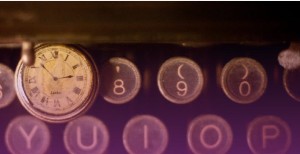 This opera is being groomed by COT’s Vanguard Initiative, which develops new operas by emerging composers. The story takes place a century ago on New Year’s Eve in Chicago, 1919. Just before the stroke of midnight, an anonymous woman leaps from the rooftop of a downtown hotel. The next morning, a young reporter named Abigail digs into the identity of this mysterious jumper, only to come face to face with some unsettling personal truths. The performance will be a semi-staged, concert-style.
This opera is being groomed by COT’s Vanguard Initiative, which develops new operas by emerging composers. The story takes place a century ago on New Year’s Eve in Chicago, 1919. Just before the stroke of midnight, an anonymous woman leaps from the rooftop of a downtown hotel. The next morning, a young reporter named Abigail digs into the identity of this mysterious jumper, only to come face to face with some unsettling personal truths. The performance will be a semi-staged, concert-style.
“Soldier Songs” (2019) by David T. Little to words of war veterans
May 14, 15, 16, 17: Chicago Opera Theater at Museum of Contemporary Art, click for details.
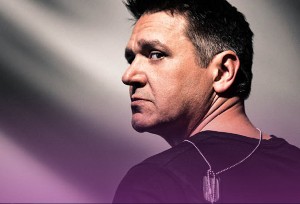 Baritone Nathan Gunn returns to the Chicago stage in this contemporary one-man opera produced with Beth Morrison Projects, which pioneers new multimedia events. “Soldier Songs” combines theater, opera, rock-infused concert music, and film footage to present recollections of veterans from five wars. First performed by the Pittsburgh New Music Ensemble in 2006 with another singer, the show’s current star is a name Chicago may know. Gunn’s many performances here include “Show Boat” and “Billy Budd” as well as “The Magic Flute” and “The Barber of Seville” at Lyric, and he sang the title role in “The Marriage of Figaro” at Ravinia.
Baritone Nathan Gunn returns to the Chicago stage in this contemporary one-man opera produced with Beth Morrison Projects, which pioneers new multimedia events. “Soldier Songs” combines theater, opera, rock-infused concert music, and film footage to present recollections of veterans from five wars. First performed by the Pittsburgh New Music Ensemble in 2006 with another singer, the show’s current star is a name Chicago may know. Gunn’s many performances here include “Show Boat” and “Billy Budd” as well as “The Magic Flute” and “The Barber of Seville” at Lyric, and he sang the title role in “The Marriage of Figaro” at Ravinia.
“L’incoronazione di Poppea” (1643) by Claudio Monteverdi
June 12, 14, 15, 17: Haymarket Opera at Jarvis Opera Hall, click for details.
If you missed the saga of the coronation of Poppea when John Eliot Gardiner and his Monteverdi Choir accompanied by the English Baroque Soloists came to the Harris on their international tour in 2017, here is another chance to witness one of the towering theatrical masterpieces that emerged between the death of Shakespeare and the birth of Bach. Kangmin Justin Kim, the same countertenor who played the pathological 1st-century Roman Emperor Nero with Gardiner’s traveling troupe, will return to bring this spellbinder to life under Haymarket music director Craig Trompeter. The chamber opera ensemble will perform in an intimate setting – the wholly redesigned concert hall at the Holtschneider Performance Center on DePaul University’s campus. Monteverdi’s opera traces the story of Nero’s passionate obsession with the beautiful and ambitious Poppea and the soon-to-be banished empress who stands in her way. The music will come from a suitably spare and nimble pit band – two violins, bass violin and keyboard, with long-necked theorbo anchoring the lower end.
“Blue” (2019) by Jeanine Tesori, book by Tazewell Thompson
June 19, 21, 24, 26, 27, 28: Lyric Unlimited at Chicago Shakespeare’s Yard, click for details.
This rolling world premiere, which started at the Glimmerglass Festival in summer 2019, tells of an African American couple awaiting the birth of their son with both hope and fear. As the baby grows into a young man, the father tries to prepare his son for the realities of 21st-century America while wrestling with his own identity as a police officer, a “Black man in blue.” Lyric’s ambitious Lyric Unlimited arm has previously championed Charlie Parker’s “Yardbird,” an operatic portrait of the tortured jazzman’s genius and his demons; Gregory Spears’ “Fellow Travelers,” which revisits the McCarthy era lavendar scare; and Jack Perla’s “An American Dream,” the World War II era saga of a farm on Puget Sound, once occupied by a Japanese-American family forced into detainment, later by a couple with Jewish relations in Germany whose letters have stopped coming.


